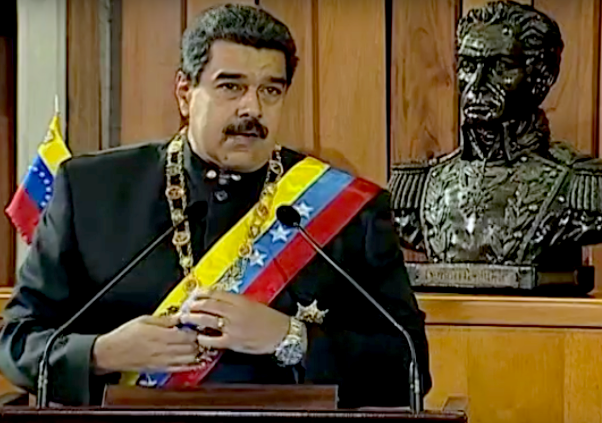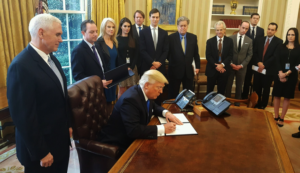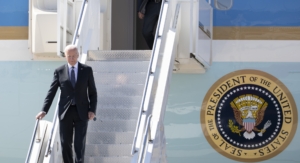The Venezuelan Referendum, Academic Influence, And Trump’s Fake News Personas
Here’s What You Need To Know
Last month, Venezuelan President Nicolas Maduro ordered a July 30th vote to elect a constituent assembly to oversee the drafting of a new constitution. However, as reported by Reuters, the country’s main opposition parties have criticized the idea of a constituent assembly “as a sham designed to keep … Maduro in power.” In fact, these opposition parties held an unofficial national referendum last Sunday where more than seven million people turned out – representing about 37% of Venezuela’s total electorate – although the government condemned the vote as illegal.
With less than two weeks to go before Maduro’s constituent assembly election, here’s a summary of what has happened so far, how Venezuela got here, and what to watch for in the coming days.
- What Was In The Opposition’s Unofficial Referendum? The referendum asked three “Yes” or “No” questions related to Maduro’s July 30th vote: (1) whether to reject the proposed constitutional assembly, (2) whether to request the military uphold the current constitution, and (3) whether to call for new presidential elections before Maduro’s term ends in 2019. Over 98 percent of the people who participated chose “Yes” on all three questions. Although the outcome is skewed because government supporters did not participate, the significant turnout and overwhelming result handed the opposition parties a symbolic victory.
- What Led To This Political And Social Crisis? Since he took power in 2013, Nicolas Maduro has continued Hugo Chavez’s policies of moving the country towards a dictatorship. Maduro’s government has muzzled the freedom of the press, effectively dissolved the elected legislature, and allowed police to kill protestors. Many Venezuelans fear Maduro will use the constitutional assembly to consolidate his powers, and saw the unofficial referendum as a last-ditch effort to delegitimize Maduro’s moves and save what they have left of their democracy.
- Why A Crisis Now? The catalyst that has added fuel to this fire has been the economic devastation brought about by the exposure of the government’s failed socialist policies to the collapse of oil prices. Venezuela’s significant oil reserves had been sustaining its economy when prices were high. While Venezuela was the wealthiest country in South America just 16 years ago, it is now among the poorest. Inflation hit 800 percent and GDP shrunk 19 percent last year. As a result, most Venezuelans now lack sufficient access to everyday necessities like food, medicine, and even toilet paper.
- What Happens Next? Despite the opposition’s referendum, Maduro has pledged to proceed with the July 30th vote. However, the opposition parties have organized a 24-hour nationwide strike, trying to pressure Maduro to abandon his plans. Meanwhile, the Trump Administration has threatened to impose new sanctions against Maduro’s government if he holds the vote, penalties that could accelerate the country’s economic collapse. Given these tensions and the violent attacks by the government, it is possible this conflict could accelerate the conflict into civil war or result in an even more aggressive crackdown by Maduro. Regardless of the result, Maduro’s determination to proceed with his push for more dictatorial power is devastating and dangerous for the Venezuelan people.
News You Can Use
ACADEMIA AS INFLUENCE TOOL
Subscribe to Receive Insights
"*" indicates required fields
There have long been relationships between corporations and think tanks, with the former providing financing for the latter for potentially favorable studies on policies they support. But as outlined in a recent Wall Street Journal investigative story, Google has taken this type of “academic influence campaign” to new heights, financing hundreds of research projects from several university researchers that have defended the company’s practices.
As a company that has had its market practices under scrutiny from regulators, both here and abroad, Google’s lobbying team created “wish lists of academic papers that included working titles, abstracts and budgets,” and then searched for authors to complete them. The program shows how in a time when corporations are increasingly using nontraditional methods to advance their interests, being able to identify the true motivation behind an organization or project is even more important to help policymakers and other influencers sort truth from fiction.
HOW SANCTIONS AGAINST RUSSIA COULD HELP RUSSIA
Last month, the U.S. Senate overwhelmingly passed a bill expanding sanctions against Russia for its alleged interference in the 2016 election. However, according to Wolfgang Ischinger, former German ambassador to the U.S., some parts of this legislation could actually strengthen Russia. The bill extends sanctions to energy ventures in any country where Russian firms are at all involved, potentially jeopardizing projects that could ultimately serve as an alternative to Russian energy.
For example, the sanctions would stall the two-thirds of Kazakhstan’s oil exports that are shipped through the Caspian Pipeline Consortium because a Russian firm has a 31% stake in the pipeline. The bill shows how legislation designed to make strong statements can often have large and unforeseen consequences.
LOCAL COMMUNITIES GRAPPLE WITH COST OF OPIOID CRISIS
The national opioid crisis has hit nearly every part of this country, both in urban and rural areas. As this tragedy deepens, local communities are struggling to pay for programs that are necessary to respond. Two examples are the growing cost of the administering the drug Narcan, which can reverse the effects of opioid overdoses, and cleaning up the increased number of used needles polluting public areas like parks, baseball diamonds, trails, and beaches.
Many local officials are even considering harsh measures to keep costs down, such as making overdose survivors pay for Narcan or cutting the drug off from individuals who have overdosed on opioids more than once. Whether or not political leaders, local and national, can shift their attention from opioid addiction management to prevention will determine if these policies can be avoided and if a health crisis will become a fiscal crisis across the country.
TRUMP’S FAKE NEWS PERSONAS
A new analysis from Snopes reveals how “false allegations and misleading claims” are shaping public perception of President Trump. According to the report, false narratives driven by the media leveled against the President largely draw from and feed into critical personas of him as either an international embarrassment, a tyrant, a bully baby, or a buffoon.
Since so many of Trump’s critics see him as fitting into one of these categories, these fake stories quickly gain widespread traction and further reinforce the original view, even when the reports are misleading or turn out to be untrue. Many of these reports have even gained prominence in mainstream outlets, such as Politico and Buzzfeed. This vicious cycle reveals how – in an age of segregated media bubbles – confirmation bias can fuel falsehoods and further disconnect media coverage from the truth.
IMPACT OF E-COMMERCE ON E-MPLOYMENT
Conventional wisdom dictates that the move from retail towards e-commerce is making it more difficult for lower skilled workers to find jobs. But, a new report from economist Michael Mandel contradicts this view, arguing the net impact of e-commerce has created 321,000 jobs and raise wages 30 percent in the retail industry. He claims other economists have failed to calculate the true impact of e-commerce by excluding jobs in places like fulfillment centers and distribution warehouses.
However, it is impossible to know whether Mandel is correct because it is unclear how many general warehousing jobs are directly or indirectly connected to e-commerce. Regardless, as e-commerce increasingly comes under scrutiny for its impact on blue-collar employment, the industry will likely use his and similar findings to deflect criticism.



